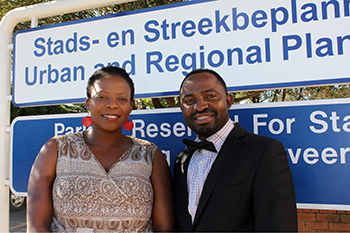Latest News Archive
Please select Category, Year, and then Month to display items
31 December 2019
|
Story Dr Cindé Greyling
|
Photo Anja Aucamp
 Dr Mariana Erasmus, SAENSE Platform Manager, says water remediation is vital for both the ecosystem and industries.
Dr Mariana Erasmus, SAENSE Platform Manager, says water remediation is vital for both the ecosystem and industries.
KovsieInnovation at the UFS supports innovative research outputs in various ways – one of which is to protect the intellectual property and to register patents where viable. This is in line with KovsieInnovation’s broader aim to create third-stream income for the university. Patent registration is a complex process and the UFS is proud to have the needed expertise to properly facilitate such an endeavour.
The SAENSE Platform
South Africa is a water-scarce country, with many water hungry industries (such as agriculture and mining). “Industrial processes often contaminate water with heavy metals, harmful chemicals, radioactive waste, and even organic sludge,” Dr Mariana Erasmus, SAENSE Platform Manager, explains.
Hence, water remediation is vital for both the ecosystem and industries. One of the key functions of the SAENSE Platform is to offer water-remedial solutions for the (bio)remediation of nitrates, heavy metals, and salts, among others. The platform’s activities and services are supported by undergraduate and postgraduate students and researchers, using Technology Innovation Agency (TIA) funding. TIA is a national public entity that serves as key institutional intervention to bridge the innovation chasm between research and development.
From waste to water
Through the joint effort of two mining companies and the UFS/TIA SAENSE Research Platform, a new treatment for mine drainage (MD) has been developed. This patented B-DAS (Barium – Dispersed Alkaline Substrate) technology effectively treats the major contaminants found in acid, alkaline, or neutral mining wastewater. The aim of the B-DAS system is to provide a passive water-treatment solution with minimum waste production; it can also be a potential pre-treatment for reverse osmosis (RO) to lower the requirements of the membranes and therefore potentially reduce the RO cost.
The success of the patent is that it turns unusable water into water that is fit for agricultural purposes at a reduced cost and increased efficiency.
Young academic receives BRICS research funding
2017-04-13

Dr Thulisile Mphambukeli and Dr Victor Okorie
from the Department of Urban and Regional Planning
at the University of the Free State.
Photo: Rulanzen Martin
“It means a lot to me, as I am a young academic embarking on my postdoctoral research project. To be able to lead a team of researchers from various research institutions in South Africa is humbling.” This is what Dr Thulisile Mphambukeli had to say on being awarded a research grant by the South African BRICS Think Tank.
The think tank, in collaboration with the National Institute for the Humanities and Social Sciences (NIHSS), awarded the lecturer in Urban and Regional Planning at the University of the Free State (UFS) R150 000. She will spearhead a research project between BRICS (Brazil, Russia, India, China, and South Africa) universities. “They have awarded me a three-month grant to facilitate a process of combining various research projects under the BRICS Academic Cluster,” Dr Mphambukeli said.
Platform provides collaboration
“The academic cluster provides a platform for researchers and academics to engage in ongoing collaboration,” she said. The grant will enable her and her research partner, Dr Victor Okorie, postdoctoral fellow in the Department of Urban and Regional Planning at the UFS, to put together a research proposal to be submitted at the end of May 2017. If successful, her team will conduct a research study across BRICS countries over a period of three years. It will be done in collaboration with various South African universities, who will form a team to collaborate with researchers from BRICS universities.
Great accomplishment for UFS
“The funds we have received are quite a great accomplishment for the UFS and our department,” Dr Okorie said. The UFS has become a force to be reckoned with when it comes to emerging issues in BRICS politics and policies. “Our project looks at the provision of ecosystems, agriculture, and security and the UFS was chosen as the host institution.”